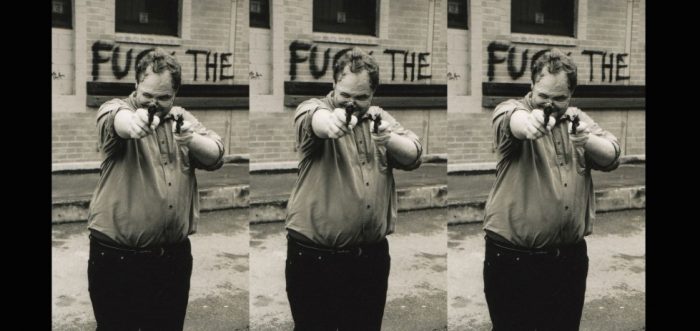Jarret Gahan’s first feature takes Andrew Leavold’s (of The Search For Weng Weng fame) no-budget tribute to the ’60s softcore flicks of Doris Wishman as its subject, and is a solid look at a near disasterpiece. Through extensive interviews with cast and crew, Gahan competently reconstructs the chaotic behind-the-scenes of Lesbo-A-Go-Go in the lead up to its shambolic and slapdash premiere at Melbourne Underground Film Festival in 2003. Much like Lesbo-A-Go-Go itself, what Gone Lesbo Gone clearly lacks in financing, it makes up for in its compulsive reconstruction of the past.
Gahan’s documentary proficiently retraces the film’s history, intercutting talking heads interviews with the (volunteer) cast and crew with behind the scenes footage, clips from Doris Wishman’s back catalogue, video from Lesbo-A-Go-Go itself and other assorted oddities. Stock music, DVD-esque title cards, and general low production values abound, which is okay given the context of its presentation; Gone Lesbo Gone is a film for the fans of weird and obscure underground Australian trash cinema made by a fan of the cheap and bizarre, and it’s rightfully proud of it. Gahan, who occasionally appears in on-screen in a series of interviews here, was a loyal customer of Leavold’s Trash Video1 and worked as a cinematographer on Lesbo-A-Go-Go.2
In many ways Gone Lesbo Gone is the perfect Melbourne Underground Film Festival feature, an amusing documentary that focuses on an extremely niche topic, one tangential to all the other weird and wonderful films on show. The film also bears local significance, given the appearance of well-known Australian trash-cinema associates like Neil Foley (of Monster Pictures) and Leavold himself, and Gone Lesbo Gone‘s MUFF premiere. It’s also bears a number of (likely accidental) meta-textual similarities to Leavold’s original production; Gahan’s Gone Lesbo Gone is clearly a passion project, extending from his involvement in Leavold’s production as a young adult and, like Lesbo-A-Go-Go, the film has clearly been thrown together on a miniscule budget, relying on the good will of friends and associates to give up their time to appear.
While its roots are in a 25 minute DVD featurette from 2011 which never saw release, there isn’t much glut here, and Gahan’s project (while not the most formally impressive) never feels needlessly padded with irrelevant side-plots. Gahan’s portrait of Brisbane’s alternative music and film scene in the early-2000s is fascinating, and adds value to the feature rather than simply extending its runtime. In some ways, it may have been more interesting to extend his analysis of these significant cultural undercurrents further, spending more time looking at the crazy bands like They Might Be Vaginas which were prominent in the underground music scene of the era, and contributed substantially to Leavold’s feature.
The film’s study of Andrew Leavold, one of the most well known figures in Australia’s underground film scene, is strong, especially considering how much he seems to have changed between Lesbo-A-Go-Go and The Search for Weng Weng. While in the film’s almost exclusive focus on the production of Lesbo-A-Go-Go manages to touch upon external narratives surrounding the role of Trash Video in Brisbane’s underground film scene, and Leavold’s personal issues during the production of the film, it could have benefited from a stronger focus on both aspects, repurposing itself as a bit of an exploration of the man himself rather than solely on his output.
It’s great to see that Lesbo-A-Go-Go – a piece of cult underground Australiana – has been unearthed for another screening and Gahan’s dedication to documenting its bizarre legacy is quite impressive. While the double feature will cater almost exclusively to a niche audiences, and although neither are formal masterworks by any means, Gone Lesbo Gone is a solid effort from Gahan, especially considering that it seems to have been constructed under budgetary constraints similar to those that afflicted its subject. It’s a labour of love, a passion project from a man whose professional trajectory has clearly been influenced by his early work on Leavold’s insanely slapdash production, and it’s in here its ultimate strength lies.
Gone Lesbo Gone: The Untold Tale of an Unseen Film! will have its world premiere at Melbourne Underground Film Festival on Sunday the 13th of September at 9pm. It screens back to back with Leavold’s original feature Lesbo-A-Go-Go.

